If引导的条件状语从句知识讲解
If引导的条件状语从句

If引导的条件状语从句一、If引导的条件状语从句的结构If+主语+谓语+其它,主语+谓语+其它.=主语+谓语+其它+if+主语+谓语+其它.注:①有if 的是从句,另一个是主句② if 从句在前有逗号,if从句在后无逗号eg.If he runs, he will arrive there in time .=He will arrive there in time if he runs .如果他跑,她将会准时到达.二、if条件句主句和从句的时态,if译为如果1.主句用一般将来时(will+ V-原),if 从句用一般现在时(be用is/am /are ,实义动词用V-原/V-三单), 即主将从现注:①当主语为I ,you, we, they ,复数名词,以及由and连接的两个并列成分等时,实义动词用V-原②当主语为he ,she ,it ,that ,单个人名,单数名词等时,用V-三单)eg .If it is (be) rainy , we will stay(stay) at home .If she studies (study ) hard , she will get (get) good grades .2.若主句中含有情态动词(can/may/ must/may/might/should )时,主句为情态动词+ V-原,if从句用一般现在时eg .We can will go(go) out if it stops (stop ) raining .eg.If you want (want) to get good grades ,you should study (study)hard.3.若主句为肯定祈使句或否定祈使句时,if从句用一般现在时注:以V-原开头的句子是肯定祈使句,否定祈使句在V-原前加Don’teg. Eat (eat) them if you are (be) hungry .eg. Don’t go (not go)to play football if she doesn’t finish (not finish)your homework .拓展:if 还可引导宾语从句,译为“是否”If 引导宾语从句时,时态需根据语境确定,如果主句是一般现在时,从句可以根据具体情况选用时态,如果主句是一般过去时,从句必须跟过去时相关( )1.----Mike wants to know if _________ a picnic tomorrow .----- Yes . But if it _________ , We will visit the museum .A. will you have , will rainB. you will have , will rainC. you will have ,rainsD. will you have , rain( )2.We are not sure if it ____ tomorrow .If it ____ , our sports meeting will be put off .A. will rain , rainsB. rains , will rainC. will rain ; will rain ( )3. ---Can you guess if Mike _______ swimming this afternoon ?---I think he will go with us if he _______ fine .A. will go ,isB. will go ,will beC. goes , isD. goes ,will be答案解析:1.迈克想知道是否你们明天将去野营,if译为是否,引导宾语从句,时态根据语境而定,句末有tomorrow , 所以要用将来时。
if 条件状语从句
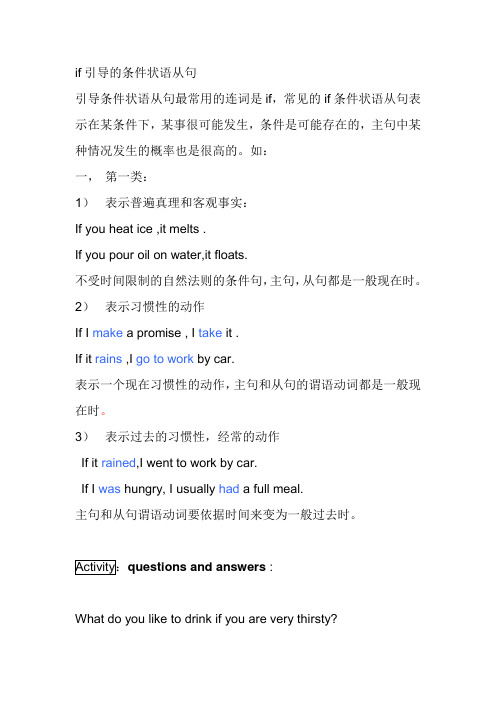
if引导的条件状语从句引导条件状语从句最常用的连词是if,常见的if条件状语从句表示在某条件下,某事很可能发生,条件是可能存在的,主句中某种情况发生的概率也是很高的。
如:一,第一类:1)表示普遍真理和客观事实:If you heat ice ,it melts .If you pour oil on water,it floats.不受时间限制的自然法则的条件句,主句,从句都是一般现在时。
2)表示习惯性的动作If I make a promise , I take it .If it rains ,I go to work by car.表示一个现在习惯性的动作,主句和从句的谓语动词都是一般现在时。
3)表示过去的习惯性,经常的动作If it rained,I went to work by car.If I was hungry, I usually had a full meal.主句和从句谓语动词要依据时间来变为一般过去时。
questions and answers :What do you like to drink if you are very thirsty?How many days are there in February it it is a leap year ? Who do people go and see if they get ill ?第二类:If we catch the 10 o’clock train ,we shall (will ,can,may,must ,should ) get there in time .If it is fine tomorrow ,we can have a picnic somewhere.If you wake up before me , give me a call .条件句(从句)用一般现在表示将来,主句用shall 加动词原型或者是祈使句在if 引导的条件状语从句中,如果从句谈论的是一个有可能发生的事实及其产生的相关的结果,主句用一般将来时态,从句用一般现在时态。
知识点名:if引导的条件状语从句

知识点名:if引导的条件状语从句讲义:if引导的条件状语从句1. if意为“如果”,引导条件状语从句时,既可放在主句前面,也可放在主句后面。
若if条件句放在句首,从句后面常加逗号与主句隔开。
If you go there, I'll go, too.如果你去那儿,我也会去。
My mother will take me to the park if she is free.如果我妈妈有空,她就会带我去公园。
2. 时态运用:在含有if引导的条件状语从句的主从复合句中,主句为下列情形之一的,条件状语从句通常用一般现在时。
(1) 主句是一般将来时,即遵循“主将从现”的原则。
If he comes, he will bring his violin.如果他来,他就会把他的小提琴带来。
(2) 主句是含有情态动词may/might/can/must/should等的句子。
If you want to lose weight, you must eat less bread.如果你想减肥,你必须少吃面包。
(3) 主句是祈使句。
If you are not strong enough, please don't take part in such an activity.如果你不是很健壮,请不要参加这种活动。
3. 句型转换:(1) 借助“祈使句+and/or+陈述句(一般将来时)”这一句型来转换。
其中,在句意上and表示顺承;or表示转折,意为“否则”。
If you work hard, you'll pass the exam easily.=Work hard, and you'll pass the exam easily.努力学习,你将很容易通过考试。
Work hard, or you won't pass the exam easily.努力学习,否则你不会轻易地通过考试。
【英语知识点】if引导的条件状语从句
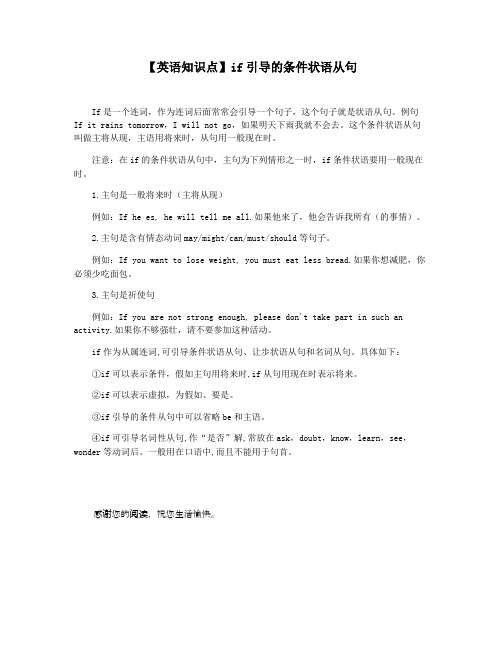
【英语知识点】if引导的条件状语从句
If是一个连词,作为连词后面常常会引导一个句子,这个句子就是状语从句。
例句If it rains tomorrow,I will not go,如果明天下雨我就不会去。
这个条件状语从句叫做主将从现,主语用将来时,从句用一般现在时。
注意:在if的条件状语从句中,主句为下列情形之一时,if条件状语要用一般现在时。
1.主句是一般将来时(主将从现)
例如:If he es, he will tell me all.如果他来了,他会告诉我所有(的事情)。
2.主句是含有情态动词may/might/can/must/should等句子。
例如:If you want to lose weight, you must eat less bread.如果你想减肥,你必须少吃面包。
3.主句是祈使句
例如:If you are not strong enough, please don't take part in such an activity.如果你不够强壮,请不要参加这种活动。
if作为从属连词,可引导条件状语从句、让步状语从句和名词从句。
具体如下:
①if可以表示条件,假如主句用将来时,if从句用现在时表示将来。
②if可以表示虚拟,为假如、要是。
③if引导的条件从句中可以省略be和主语。
④if可引导名词性从句,作“是否”解,常放在ask,doubt,know,learn,see,wonder等动词后。
一般用在口语中,而且不能用于句首。
感谢您的阅读,祝您生活愉快。
if 引导条件状语从句

if 引导条件状语从句摘要:1.了解IF引导条件状语从句的定义和作用2.分析IF引导条件状语从句的语法结构3.举例说明IF引导条件状语从句的用法4.对比IF引导条件状语从句与其他条件表达方式的差异5.总结IF引导条件状语从句的注意事项正文:在英语语法中,IF引导的条件状语从句是一种常见的关系从句,用于表示某个条件成立时,主句所表达的结果或行为会发生。
IF引导条件状语从句的主要作用是说明条件与结果之间的关系,以便在句子中表达清晰、准确的逻辑关系。
IF引导条件状语从句的语法结构如下:1.条件状语从句:IF + 条件(主语+ 谓语)2.主句:主语+ 谓语+ 宾语(或其他成分)例如:1.If it rains tomorrow, we will stay at home.(如果明天下雨,我们将呆在家里。
)2.If you study hard, you will pass the exam.(如果你努力学习,你就会通过考试。
)与其他表示条件的表达方式相比,IF引导的条件状语从句具有一定的优势:1.相较于使用“万一”、“如果”等词汇,IF引导的条件状语从句更加简洁、明了。
2.IF引导的条件状语从句可以清晰地呈现条件与结果之间的关系,使句子逻辑更加清晰。
在使用IF引导条件状语从句时,需要注意以下几点:1.条件状语从句中的条件可以是真实的,也可以是假设的。
2.条件状语从句中的条件通常用现在时态表示,但也可以根据需要使用其他时态。
3.主句中的谓语动词通常表示结果或行为,如:be、become、do、go 等。
总之,IF引导条件状语从句是英语中表达条件与结果关系的一种重要手段。
UNIT5if引导的状语从句语法讲解
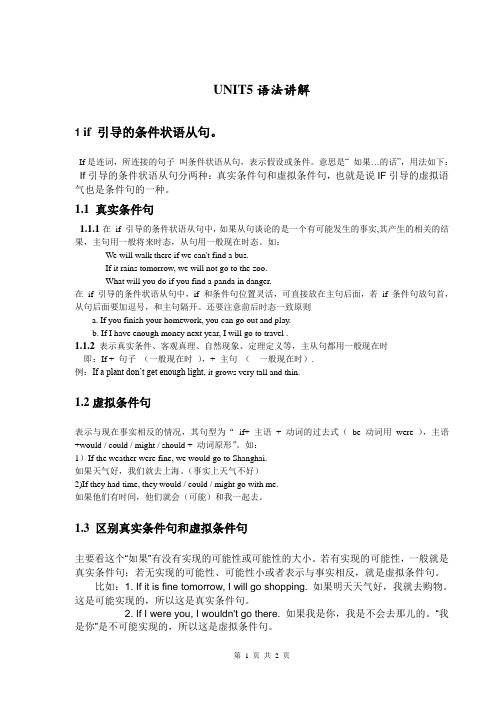
UNIT5语法讲解1 if 引导的条件状语从句。
If是连词,所连接的句子叫条件状语从句,表示假设或条件。
意思是“ 如果…的话”,用法如下:If引导的条件状语从句分两种:真实条件句和虚拟条件句,也就是说IF引导的虚拟语气也是条件句的一种。
1.1 真实条件句1.1.1在if 引导的条件状语从句中,如果从句谈论的是一个有可能发生的事实,其产生的相关的结果,主句用一般将来时态,从句用一般现在时态。
如:We will walk there if we can't find a bus.If it rains tomorrow, we will not go to the zoo.What will you do if you find a panda in danger.在if 引导的条件状语从句中,if 和条件句位置灵活,可直接放在主句后面,若if 条件句放句首,从句后面要加逗号,和主句隔开。
还要注意前后时态一致原则a. If you finish your homework, you can go out and play.b. If I have enough money next year, I will go to travel .1.1.2表示真实条件、客观真理、自然现象、定理定义等,主从句都用一般现在时即:If + 句子(一般现在时),+ 主句(一般现在时).例:If a plant don’t get enough light, it grows very tall and thin.1.2虚拟条件句表示与现在事实相反的情况,其句型为“if+ 主语+ 动词的过去式(be 动词用were ),主语+would / could / might / should + 动词原形”。
如:1)If the weather were fine, we would go to Shanghai.如果天气好,我们就去上海。
英语中if引导的从句
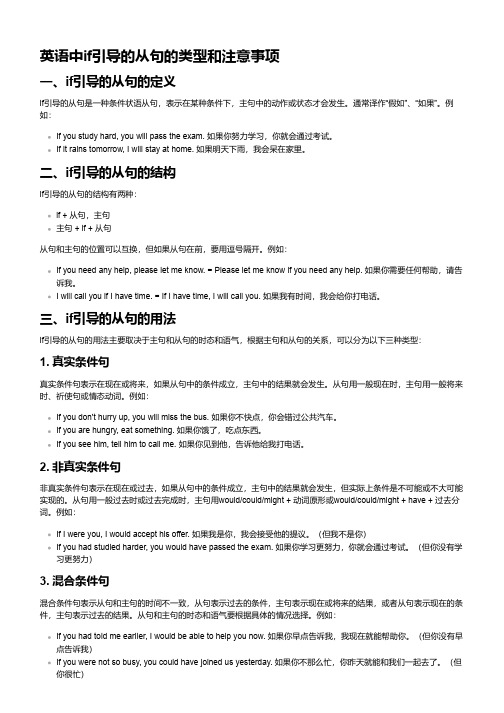
英语中if引导的从句的类型和注意事项一、if引导的从句的定义if引导的从句是一种条件状语从句,表示在某种条件下,主句中的动作或状态才会发生。
通常译作“假如”、“如果”。
例如:If you study hard, you will pass the exam. 如果你努力学习,你就会通过考试。
If it rains tomorrow, I will stay at home. 如果明天下雨,我会呆在家里。
二、if引导的从句的结构if引导的从句的结构有两种:if + 从句,主句主句 + if + 从句从句和主句的位置可以互换,但如果从句在前,要用逗号隔开。
例如:If you need any help, please let me know. = Please let me know if you need any help. 如果你需要任何帮助,请告诉我。
I will call you if I have time. = If I have time, I will call you. 如果我有时间,我会给你打电话。
三、if引导的从句的用法if引导的从句的用法主要取决于主句和从句的时态和语气,根据主句和从句的关系,可以分为以下三种类型:1. 真实条件句真实条件句表示在现在或将来,如果从句中的条件成立,主句中的结果就会发生。
从句用一般现在时,主句用一般将来时、祈使句或情态动词。
例如:If you don't hurry up, you will miss the bus. 如果你不快点,你会错过公共汽车。
If you are hungry, eat something. 如果你饿了,吃点东西。
If you see him, tell him to call me. 如果你见到他,告诉他给我打电话。
2. 非真实条件句非真实条件句表示在现在或过去,如果从句中的条件成立,主句中的结果就会发生,但实际上条件是不可能或不大可能实现的。
if引导的条件状语从句总结(精)
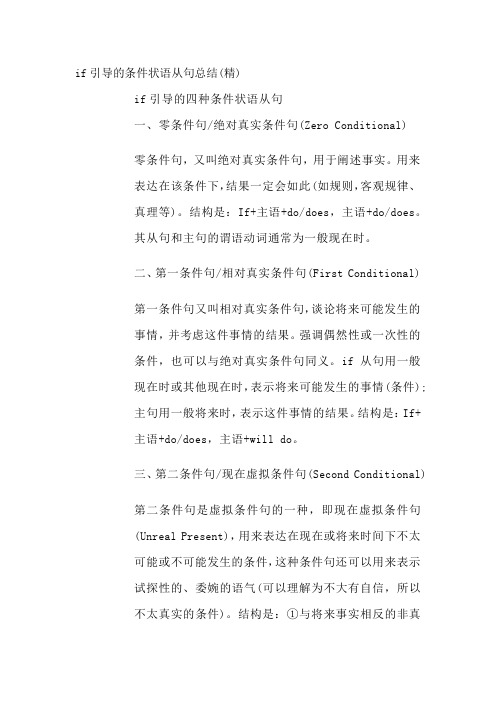
if引导的条件状语从句总结(精)if引导的四种条件状语从句一、零条件句/绝对真实条件句(Zero Conditional)零条件句,又叫绝对真实条件句,用于阐述事实。
用来表达在该条件下,结果一定会如此(如规则,客观规律、真理等)。
结构是:If+主语+do/does,主语+do/does。
其从句和主句的谓语动词通常为一般现在时。
二、第一条件句/相对真实条件句(First Conditional)第一条件句又叫相对真实条件句,谈论将来可能发生的事情,并考虑这件事情的结果。
强调偶然性或一次性的条件,也可以与绝对真实条件句同义。
if从句用一般现在时或其他现在时,表示将来可能发生的事情(条件);主句用一般将来时,表示这件事情的结果。
结构是:If+主语+do/does,主语+will do。
三、第二条件句/现在虚拟条件句(Second Conditional)第二条件句是虚拟条件句的一种,即现在虚拟条件句(Unreal Present),用来表达在现在或将来时间下不太可能或不可能发生的条件,这种条件句还可以用来表示试探性的、委婉的语气(可以理解为不大有自信,所以不太真实的条件)。
结构是:①与将来事实相反的非真实条件句是If+主语+should do/were to do/did,主语+would/should/could/might do;②与现在事实相反的非真实条件句是If+主语+did,主语+would/should/could/might+do。
四、第三条件句/过去虚拟条件句(Third Conditional) 第三条件句是表示与过去事实相反的虚拟语气,是用来表达如果(If)当时那样发生,另外一方面(当时)结果会如何。
通常是指过去的事情,带有一切已经太迟而不能够补救的意思。
结构是:If+主语+had done,主语+would/should/could/ might+have done。
if 条件句的时态搭配1.if从句用一般现在时,主句用一般将来时2.if从句用一般现在时,主句用may/might/canIf the fog gets thicker the plane may/might be diverted.3.if从句用一般现在时,主句用must/shouldIf you want to lose weight you must/should eat less bread.4.if从句用一般现在时,主句用一般现在时5.if从句用现在进行时,主句用一般将来时6.if从句用现在完成时,主句用一般将来时If you have finished dinner I’ll ask the waiter for the bill.。
- 1、下载文档前请自行甄别文档内容的完整性,平台不提供额外的编辑、内容补充、找答案等附加服务。
- 2、"仅部分预览"的文档,不可在线预览部分如存在完整性等问题,可反馈申请退款(可完整预览的文档不适用该条件!)。
- 3、如文档侵犯您的权益,请联系客服反馈,我们会尽快为您处理(人工客服工作时间:9:00-18:30)。
2. 借助介词with 或without来转换。
例如: If you help me, I’ll finish my job soon.
W--i-t-h--y--o-u--r--h--e-l-p-, I’ll finish my job soon. 如果你帮我,我将很快完成我的工作。 If there is no water, fish may die.
• 2. 在if引导的条件状语从句中不能够使用some, 而要用any。
• 例如: If you have any questions to ask, please come to my office. 如果你有问题要问的 话,请到我办公室来。
1. if 在句中的含义不同 I want to know if he is a teacher.
3 If she ___d_o_e_s_n_’t_g_e_t____(not get ) up early , she’ll miss the early bus .
3. 时态要求上有区别
1.I want to know if there will be
a
sports meeting next month.
If 引导的宾语从句的时态由主句及本身时
态决定;
2.If it doesn’t rain , we’ll hold it.
If 引导条件状语从句的时态为一般现在时 记住“主将从现”
I won’t go there _____ I _____hear from you. I won’t go to the party if I am not invited. (同义句)
I won’t go to the party_u__n__less I am invited.
变换:
1.有if引导的条件状语从句的复合句中,当主句和从句的 主语均为you时,可转换为“祈使句,and+简单句”或
Fish may die w--i-th--o--u-t--w--a--t-e-r--. 如果没有水,鱼可能会死。
• 注意事项 • 1. 在if引导的条件状语从句中,当主句是一般将
来时时,不能够使用be going to结构,而要用 will。 • 例如: I’ll help you with your English if I am free tomorrow. 如果明天我有空,我会帮你学英 语。
whether
If 在宾语从句中翻译为“是否”
I’ll go to see you if I am free next week.
If 在条件状语从句中翻译为“如果”
2. if 在从句中的位置不同 I don’t know if the train has arrived.
I will go out tomorrow if it doesn’t rain.
the meeting ?
2. She will not go there if it is rainy tomorrow.
3. I can’t guess if she will be angry .
4. If we help each other , we both will get good results .
“祈使句,or+简单句” You can pass the exam if you work hard. Work hard ----------------,and you will pass the exam.
If you don't hurry up,you will be late again.
If引导的条件状语从句
潘店镇中学
if引导的条件状语从句
例句:If people obey the traffic rules, →从句 there will be fewer accidents. →主句
if:从属连词,意思是:“如果,假如,倘若”
: 结构
if引导的条件状语从句既可以放在句子前, 也可以放在句子后。
时态:
if引导的条件状语从句, 主句用一般将来时(will),从句用一般现在时。
→主句谓语中也可以含有情态动词, 如:must,can,could,should等
: 例句 如果交通指示灯是红的,你必须停下来等一等。
eg:If the traffic lights are red,you must stop and wait. →主句谓语中也可以用had better(not)do,提建议
例句:如果你想减肥,你最好锻炼。 eg:If you want to lose weight,you had better take some
exercise.
if的反义词:if...not...=unless,意思是:“如果不,除非”
I won’t go there unless I hear from you.(同义句 将其与主句隔开。
原句可改为:There will be fewer accidents if people obey the traffic rules.
例句:If people obey the traffic rules, there will be fewer accidents.
1 If I _d_o_n_’_t _u_n_d_e_rs_t_an_d__(not understand), I will ask my teacher for help .
2 If I ___c_o_p_y____(copy ) your homework , I will cheat myself .
= If it doesn’t rain, I will go out tomorrow.
If 引导的宾语从句放在主句之后;而if引 导的状语从句可放在主句之前也可放在主 句之后
If 引导的条件状语从句放于句首时多用逗号隔开; 而if引导的宾语从句则不能。
1. Can you tell me if she can come to
